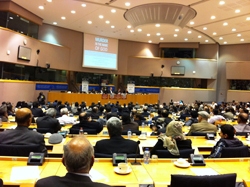![]()
The Words of the Marsh Family
|
|
The Words of the Marsh Family |

A policy debate on extremism, held in the European Parliament yesterday, 20th September, considered what responses to extremist religious views were effective while maintaining freedom of speech and other fundamental freedoms of liberal, western democracies. The debate, chaired by Dr. Charles Tannock MEP and convened with the support of the Ahmadiyya Muslim community, approached the threat of extremism to all communities.
Very articulate and well researched presentations from Dr. John Bew, the Co-Director of International Center for the Study of Radicalization at Kings College London and Sofia Lemmetyinen, the EU Liaison Officer for Christian Solidarity Worldwide, presented a picture of radicalization and intolerance that is insufficiently challenged either in chat rooms, in the public sphere or in international diplomacy. Journalist and daughter of the late Salman Taseer, the Governor of the Punjab in Pakistan who was assassinated earlier this year due to his opposition to religious extremism, was unable to attend and speak on 'Religious Persecution in Pakistan' as planned because of the sudden abduction of her brother. Sofia Lemmetyinen explained that worldwide 60 nations seek to control religion and to restrict religious belief in some form within their borders representing 70% of the world's population. However these restrictions do not lead to a safer society.
"Religiously motivated violence or extremism is a global and transnational challenge, threatening principles of pluralism, fundamental freedoms and the rights of minorities. States have a responsibility to address extremism by bringing perpetrators to justice, by compensating victims of such violence and by supporting initiatives for meaningful communal dialogue. We need long-term commitment at both national and international levels, and a willingness to understand underlying root causes and sociopolitical and economic grievances that potentially nurture extremist mindsets." She suggested that meaningful change was a long term process requiring careful consideration of education textbooks, promotion of sustained interfaith dialogue and proactive conflict resolution. She thought that the EU's External Action Service should have a focus unit to study religious freedom issues.
Dr. John Bew similarly said a long term process of challenging extremists increasingly on the internet, but also on campuses and in religious institutions and support for interfaith dialogue was the only effective policy.
Dr. Charles Tannock MEP, who is a member of the European Parliament's (EP) Human Rights Committee, Foreign Affairs Committee and Vice-President of the EP delegation to the NATO Parliamentary Assembly, said
"The ideology that has spawned violent extremism and reactive violent extremism has its roots in a distorted interpretation of religion -- be it Islam, Christianity or any other faith." He added that religious extremism is a security threat to Europe.
"Sometimes the links made with religion are direct and overt, in other cases they are subtle and more obscure, but in all cases they are used to project a moral sense of purpose for what is simply cold blooded murder in the name of God."
He wanted to see grants of European Aid to be contingent upon the maintenance of human rights standards.
Rafiq Hayat, National President Ahmadiyya Muslim Community UK said:
"Religious fundamentalism is a global problem -- but its origins are local and manifested by the targeting of minorities. These fundamentalists are on a journey. They flex their muscles by targeting mosques of say Ahmadi Muslims or Shia Muslims, or a temple, synagogue or church. By and large these are ignored on the world stage. Emboldened by their action and the lack of effective authority against them, the fundamentalists set their sights on other targets.
"We have witnessed the growth of this cancer of terror by the targeting of our community- from small scale boycotts to gun and grenade attacks on our mosques in Pakistan, and in mob violence in Indonesia.
"It is a folly for the West to think terrorists will stop at simply targeting one community- this is only the thin end of the wedge. The ideology is already spreading to Europe via the internet and satellite and more needs to be done to put an end to this hatred that breeds extremism."
"We are calling of parliamentarians to assess human rights abuses and attacks on minorities as part and parcel of a global terror problem. It does not take a leap of faith to imagine a killer in Pakistan can also be a killer in Paris. It is only a matter of geography and time."